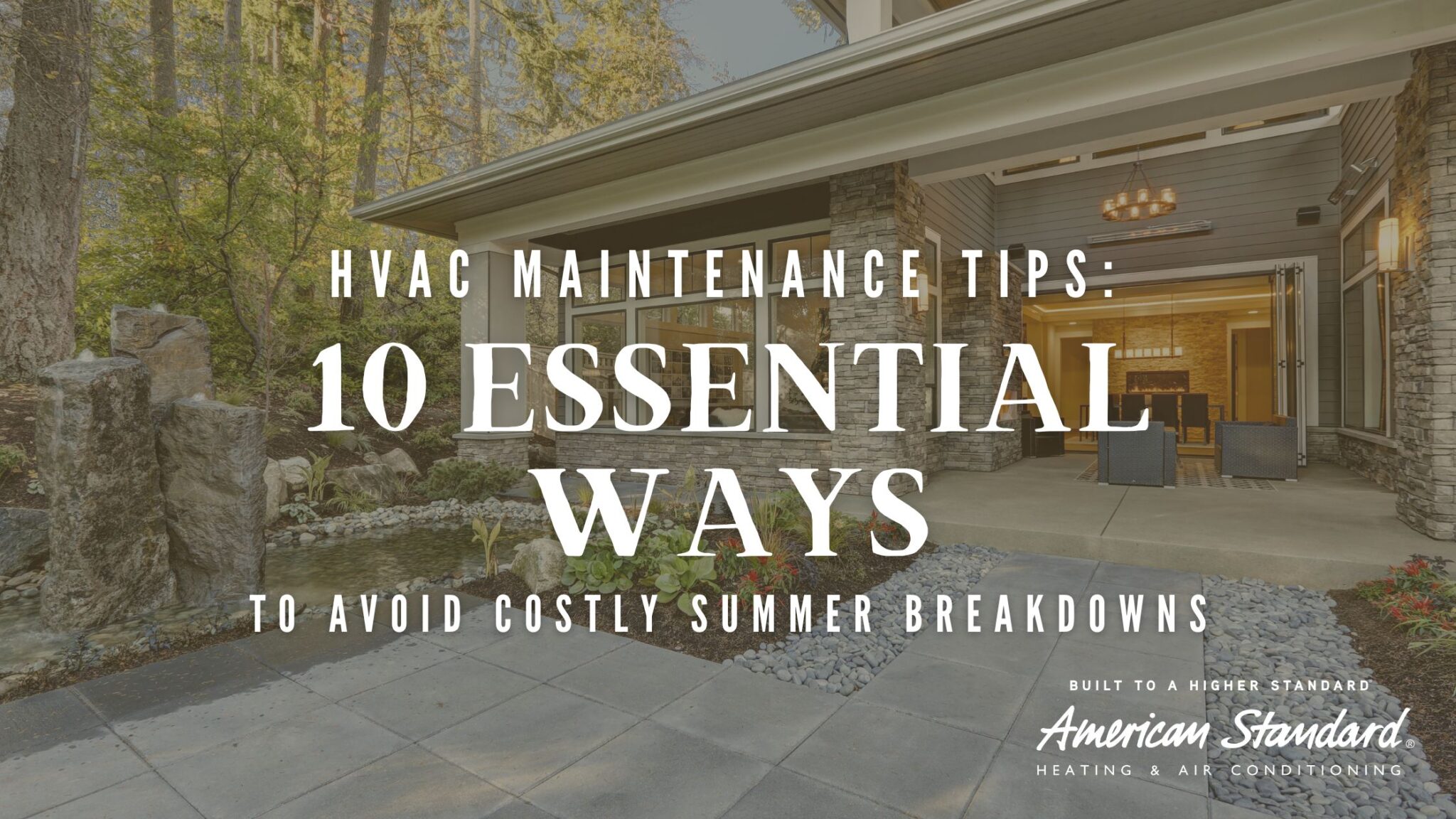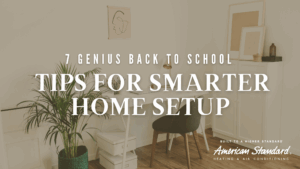HVAC Maintenance Tips: 10 Essential Ways to Avoid Costly Summer Breakdowns
HVAC maintenance tips are essential for surviving the scorching summer heat in Huntsville and Madison County. With rising temperatures and thick humidity, your air conditioner becomes the heart of your home’s comfort. But if neglected, it can break down at the worst time leaving you hot, frustrated, and facing expensive repairs. In this post, we’ll cover 10 HVAC maintenance tips to help you beat the heat, keep your system running smoothly, and avoid summer surprises.
Let’s explore the top HVAC maintenance tips every Huntsville homeowner should follow to avoid costly breakdowns.
1. Change Air Filters Regularly
Your air filter is the first line of defense in maintaining airflow and indoor air quality. When filters get clogged with dust, pet hair, and allergens, your HVAC system has to work harder to move air reducing its efficiency and shortening its lifespan.
Ideally, filters should be changed every 30 to 90 days depending on your household size, number of pets, and indoor air quality. If anyone in the home suffers from allergies or asthma, opt for more frequent changes.
Pro Tip: Set a recurring reminder on your phone or calendar to check your filter monthly. It’s a small habit that saves big on energy bills and repair costs.
2. Schedule a Professional Tune-Up
Every HVAC system needs a check-up before summer starts. A professional tune-up includes cleaning the coils, checking refrigerant levels, tightening electrical connections, and testing components to ensure your system can handle the heat.
Systems that receive regular maintenance operate more efficiently, cool faster, and last longer. Skipping tune-ups may lead to mid-season breakdowns, which are far more expensive and inconvenient to fix.
3. Clear and Clean the Outdoor Unit
The outdoor condenser unit is responsible for releasing the heat absorbed from inside your home. When this unit becomes blocked with debris like leaves, twigs, and dirt, airflow becomes restricted and performance suffers.
Keep the area around the unit clear by trimming back vegetation at least 2 feet. Gently rinse the exterior with a hose to remove buildup on the fins, but make sure the power is turned off before doing any cleaning.
4. Upgrade to a Smart Thermostat
Smart thermostats offer precise control over your home’s temperature even when you are not home. These devices learn your habits and adjust automatically to optimize comfort and savings.
You can program a schedule, track energy usage, and control settings from your phone. Smart thermostats can save you up to 10% on cooling costs over the summer months while reducing the strain on your system.
5. Seal Leaks and Improve Insulation
If your home has air leaks or inadequate insulation, your cool air is escaping and your HVAC system is working double time to compensate. Cracks around windows, doors, and attic hatches are common culprits.
Use caulk or weatherstripping to seal gaps, and consider adding insulation to your attic or walls if your home feels drafty or warm in specific spots. Well-sealed homes maintain more consistent temperatures and lower cooling costs.
6. Set Realistic Thermostat Temperatures
It’s tempting to set your thermostat to 68°F when you walk in from the heat, but this will not cool your home any faster, it just makes your system run longer.
Instead, aim for a steady and comfortable range of 76–78°F when you are home, and raise the temperature to 82–85°F when you are away to conserve energy. By applying these HVAC maintenance tips, you can improve system performance and energy efficiency.
Pro Tip: Use ceiling fans to help rooms feel 4–6 degrees cooler without lowering the thermostat.
7. Use Fans and Window Treatments
Ceiling fans are great companions to your HVAC system. They help circulate cool air, making rooms feel more comfortable and reducing the need to crank the AC. Ensure the fan blades rotate counterclockwise in summer for best results.
Close blinds and curtains during the hottest parts of the day to block solar heat gain, especially on south-facing windows. Window films and thermal curtains can also help maintain cooler indoor temperatures.
8. Monitor and Control Humidity
High humidity makes your home feel warmer than it is and it forces your AC to work harder to dehumidify the air. Keep indoor humidity levels between 30% and 50% for optimal comfort.
If your HVAC system is not effectively controlling moisture, consider installing a dehumidifier. Many modern AC systems now include built-in humidity controls as well.
9. Inspect and Seal Ductwork
Leaky ducts are a silent efficiency killer. Up to 30% of cooled air can be lost before it even reaches your rooms. If you notice uneven temperatures, dust buildup, or weak airflow, duct issues might be to blame.
A professional duct inspection can identify leaks, disconnected joints, or insulation gaps. Sealing and insulating your ductwork ensures better airflow and cooler rooms without overburdening your system.
10. Know When It’s Time to Upgrade
No matter how well you maintain it, every HVAC system has an expiration date. If your unit is over 10–15 years old, needs frequent repairs, or struggles to maintain set temperatures, it might be time to replace it.
Modern systems are quieter, more efficient, and better at controlling temperature and humidity. Upgrading to a unit with a SEER rating of 16 or higher can reduce your energy bills while improving home comfort.
Bonus: Easy Habits for Beating the Heat
These proactive HVAC maintenance tips are proven to reduce emergency repairs and extend your unit’s lifespan. Sometimes small changes make a big difference. Cook outside or during the evening to avoid heating your home during peak hours. Run the dishwasher and dryer at night, and avoid using heat-generating appliances during the day.
Drink plenty of water, wear lightweight clothing, and use cooling bedding or fans in bedrooms to sleep more comfortably without over-relying on the AC.
Frequently Asked Questions (FAQs)
Q: How often should HVAC filters be changed in summer?
A: Every 30–90 days. If you have pets or allergies, check monthly and change as needed.
Q: What is the best summer thermostat setting for comfort and efficiency?
A: 76–78°F when at home; 82–85°F when away. Pair with ceiling fans for added cooling.
Q: Why is my AC running but not cooling the house?
A: Possible causes include dirty filters, low refrigerant, thermostat issues, or blocked condenser coils. Call a technician for diagnosis.
Q: Do smart thermostats really save money?
A: Yes. Smart thermostats can save up to 10–15% on cooling costs by optimizing settings and adapting to your schedule.
Q: When should I replace my HVAC system?
A: If your unit is over 10–15 years old, breaks down frequently, or your energy bills are rising despite maintenance, it may be time to upgrade.
Contact Us – Stay Cool with Expert HVAC Maintenance in Huntsville
Beat the Alabama heat before it beats your AC. At Bunn’s Heating & Air Conditioning, we specialize in proactive HVAC maintenance to help you avoid costly breakdowns during the hottest months. Whether you need a seasonal tune-up, urgent repairs, or a high-efficiency system upgrade, our experienced team is here to keep your home cool, energy-efficient, and stress-free.
Call us at (256) 536-0967 or Schedule Service Online
Proudly serving Huntsville and Madison County, AL
With the right HVAC maintenance tips, your home stays cooler, your bills stay lower, and your system runs stronger all summer long.





